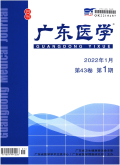广东医学2024,Vol.45Issue(9):1113-1117,5.DOI:10.13820/j.cnki.gdyx.20232624
瑞香素体外联合抗生素抗MRSA的研究
In vitro study of Daphne essential oil combined with antibiotics against MRSA
摘要
Abstract
Objective To investigate the ability of Daphne essential oil alone or in combination with antibiotics to combat methicillin-resistant Staphylococcus aureus(MRSA)in vitro,providing a basis for the use of traditional Chinese medicine or combined antibiotic therapy to treat infections caused by this bacterium.Methods MRSA standard strains and five clinical MRSA strains were collected.The minimum inhibitory concentration(MIC)of Daphne essential oil a-gainst standard and clinical MRSA strains was determined.The checkerboard method was used to observe the MIC values of Daphne essential oil combined with oxacillin,erythromycin,gentamicin,clindamycin,and levofloxacin against MRSA.Results The MIC value of Daphne essential oil against all MRSA strains was 128 μg/mL.According to CLSI 2022,all strains were resistant to penicillin,oxacillin,erythromycin,gentamicin,clindamycin,and levofloxacin,but not resistant to vancomycin and linezolid.Daphne essential oil showed a synergistic effect with levofloxacin,an additive effect with gen-tamicin and clindamycin,and an antagonistic effect with oxacillin and erythromycin.Conclusion Daphne essential oil has anti-MRSA capabilities and exhibits synergistic or additive effects with levofloxacin,gentamicin,and clindamycin.Combining these antibiotics with Daphne essential oil can reduce their MIC values,thereby reducing the development of bacterial resistance.关键词
耐甲氧西林金黄色葡萄球菌/瑞香素/体外实验Key words
methicillin-resistant Staphylococcus aureus/Daphnetin/in vitro test分类
医药卫生引用本文复制引用
何霞飞,陈开森,邹立津..瑞香素体外联合抗生素抗MRSA的研究[J].广东医学,2024,45(9):1113-1117,5.基金项目
江西省中医药管理局科技计划课题(2021A130) (2021A130)

